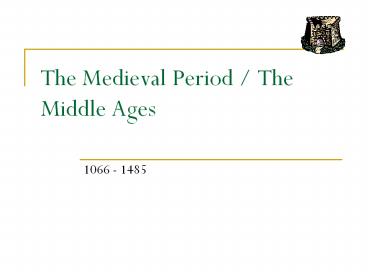The Medieval Period / The Middle Ages - PowerPoint PPT Presentation
1 / 30
Title:
The Medieval Period / The Middle Ages
Description:
The Medieval Period / The Middle Ages 1066 - 1485 ... With the emergence of new social classes comes a renewal of the English language and changes in literature. – PowerPoint PPT presentation
Number of Views:740
Avg rating:3.0/5.0
Title: The Medieval Period / The Middle Ages
1
The Medieval Period / The Middle Ages
- 1066 - 1485
2
Medieval Outline(1066-1485)
- I. Invasion and Conquest
- II. Results of the Norman Conquest
- A. Social-Political Organizations
- B. Feudalism
- C. Castle Building
- D. Establishment of Law and Order
- 1. Domesday Book
- 2. Primogeniture
- 3. Womens Status
- 4. Magna Carta
- E. Language
- III. Major Events and Institutions
- A. The Church
- B. The Crusades
- C. The Black Death
- IV. Literature
- V. The End!
3
Invasion and Conquest
- Edward the Confessors deathwho will be king?
- Harold II?
- William of Normandy?
- Battle of Hastings,
- 14 October 1066
4
Feudalism
5
Feudalism Complicated system of land control that
is held and managed by the lord to provide for
the kings needs.
Fief (feef) The land that the Lord manages for
the king. Fiefdom The practice of protecting
the land.
6
Castles
- Family living
- Defense
- Base from which the lord controlled the land
7
Castle Building
St. Mawes Castle
- 10 ft. of height / yr.
- Cold, damp
- Tapestries
8
Herstmonceux Castle
9
Edwards Castle at Beaumaris
10
Law and Order
- The Domesday Book
- King William
- dom judgment
- Enables taxation
11
Primogeniture Playing favorites
- First Born Inherits title and estate
- Second Born Clergy
- Third Born Knight
12
Women
- Status in Society
- Lost status
- Became property of fathers and husbands
- Education
- Marriage
- Chivalry and Courtly Love
- Power
- Eleanor of Aquitaine
- Powerful
- Independent
- Queen of France
- Fearless
13
The Magna Carta
Latin meaning Grand/Great Charter A treaty
among all of the lords.
14
King John Signs at Runnymede1215
15
Languages
- After the Norman Conquest, French became the
dominant language in the courts and in commerce! - DIGLOSSIA language situation where two different
languages are being used for two different
purposes - Language develops over time, is a mixture of
influences, and is always evolving.
Upper classes nobility French (High) English (Low) Lower classes peasants
Upper classes nobility aroma stench Lower classes peasants
Upper classes nobility beef cow Lower classes peasants
Upper classes nobility mutton sheep Lower classes peasants
Upper classes nobility swine pork Lower classes peasants
Upper classes nobility veal calf Lower classes peasants
Upper classes nobility mansion house Lower classes peasants
Upper classes nobility demand ask Lower classes peasants
16
The Church
- The greatest factor for unifying medieval life
was the shared Catholic religion. - Linked Norman present to the Anglo-Saxon past.
- Connected England with the European continent.
- Offered lodging for travelers and homes for
widows and orphans.
17
Canterbury Cathedral
18
1328 Europe
19
- Illuminated
- Manuscripts
- Most people didnt own one.
- Status symbol.
- Hand copied by monks.
- Might take years to copy
- Dyes were costly.
- Used vellum from animal skins.
20
The Crusades
- Military Campaigns to free the Holy Land from the
Moslems. - Lost the war, but benefited from contact with the
Arab world mathematics, medicine, and a more
refined lifestyle.
21
The Black Death 1346-1349
- 1/3 of population died
- Bubonic Plague
- Caused breakdown of feudal system
- Created new social classes
22
Spread of the Black Death
23
(No Transcript)
24
Literature
- Romance Preferred by the nobility tales of
Courtly Love instill a sense of chivalry - Ballads Oral tradition preferred by lower
classes - Miracle / morality plays Performed in local
cathedrals and were enjoyed by the masses
25
Geoffrey Chaucer Father of English Poetry
Soldier, Diplomat, Political Appointee, Master
Storyteller Father of English Poetry Vernacular
Frame Story
26
Canterbury Tales A group of pilgrims on their
journey to the shrine of Thomas a Becket
27
An original manuscript of The Canterbury Tales
28
William CaxtonThe Printing Press!
29
William Caxtons signature
30
The End!































